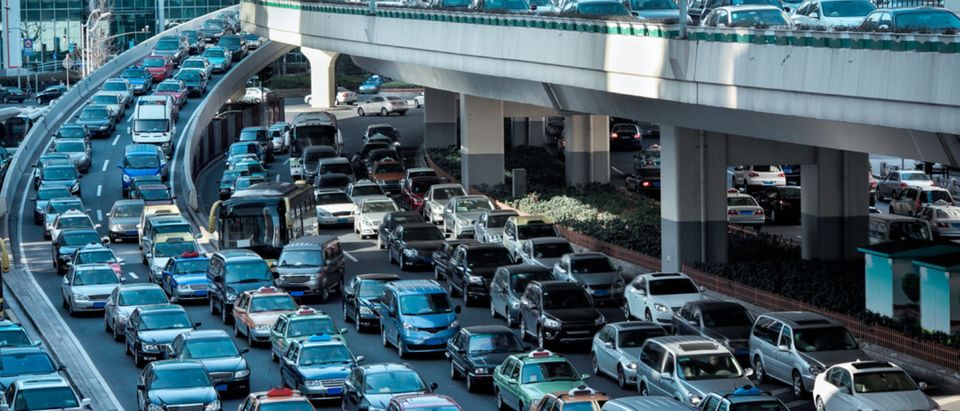Sacramento hasn’t yet outlawed gasoline- and diesel-driven automobiles. But it’s on the agenda. In the meantime, the state remains committed to former Gov. Jerry Brown’s goal of flooding California roads with zero-emissions vehicles. The transition, of course, won’t be free.
In fact, it could cost as much as $14 billion.
That enormous sum of money won’t be well spent, either. Transitioning to zero-emission vehicles (ZEVs) in California will have virtually zero effect on the climate.
Political agendas come with costs, and the campaign to purge California of vehicles with internal-combustion engines will be particularly pricey.
This week, the San Diego Union-Tribune reported the state has already committed more than $3 billion to various electric car programs when you include spending from the Volkswagen emissions scandal settlement.
This follows a new National Bureau of Economic Research paper that tells us the “required subsidy bill” for placing 1.5 million electric cars on California roads by 2025 will be “upwards” of $9 billion to $14 billion. If the natural demand for electric vehicles turns out to be lower than expected, the cost could exceed $22 billion.
One can only imagine, then, how much it will cost for the state to reach the goal of five million by 2030.
Despite the lavish government subsidies handed out for buying electric cars, only 10 percent of all vehicle sales in California are ZEVs.
The NBER paper says electric vehicle sales growth needs to increase by nearly 21 percent a year from 2018 to 2025 to reach the 1.5 million goal. Without subsidies, they project the growth would be only 12 to 14 percent per year.
Even if policymakers are able to reach this number, and even if San Francisco Democrat Assemblyman Phil Ting is able to ban sales of fossil-fuel driven cars by 2040, nothing of substance will be achieved.
While the transportation sector is California’s largest producer of greenhouse gases — 41 percent — passenger vehicles are responsible for about 70 percent of transportation GHG emissions, and roughly 28 percent of emissions overall.
Though it might seem significant to cut emissions by half, doing so is inconsequential.
California simply does not produce enough GHG emissions to make a difference. Only about 1 percent of global emissions of carbon dioxide, responsible for nearly 85 percent of all GHG emissions, is produced in this state. Even if California’s contribution were to decline to zero, the climate would not be impacted in any meaningful way.
Of course, the entire campaign against CO2 and other GHGs assumes, as Al Gore famously said, that climate science has been settled. It has not. Dispute exists, and it is wider and deeper than activists want to admit. Physicist Freeman Dyson, for instance, once said “all the fuss about global warming is grossly exaggerated.” University of Alabama-Huntsville climatologist John Christy told the New York Times a few years back that every time he hears the phrase, “‘the science is settled,’ I say I can easily demonstrate that that is false.”
Richard Lindzen, a retired Massachusetts Institute of Technology atmospheric physicist, is another who hasn’t yielded to the narrative. In a letter to President Trump, he questioned government actions “with respect to global climate that are not scientifically justified and that already have and will continue to cause serious social and economic harm — with no environmental benefits.”
Wayne Winegarden’s research has found that California’s “overzealous global warming laws and regulations” hurt those living in poor, rural, minority and inland communities the most.
At the same time, states that embrace market-based energy policies have experienced larger percentage declines in emissions than California. And they’ve done it without taxpayer-funded electric car subsidies, which are predominantly — 79 percent — claimed by households making more than $100,000 per year.
The carbon fixation of the state’s political class distracts from efforts to enact legislation that will improve Californians’ lives.
When they engage in big-ticket political theater, needed upgrades, such as overhauling the state’s broken income-tax system and relieving the exhausting taxpayer burden; curbing runaway public-employee pensions; lowering the temperature of the housing crisis; ending the man-made drought; rationally managing wildfire risk; rethinking homeless policies; and repairing the broken roads without a punishing tax hike, go unaddressed.
It’s almost as if lawmakers’ preoccupation with greenhouse gas emissions is a deliberate diversion that allows them to avoid the hard work of making meaningful public policy.
Kerry Jackson is a fellow with the Center for California Reform at the Pacific Research Institute, a nonprofit group advocating for limited government.
The views and opinions expressed in this commentary are those of the author and do not reflect the official position of The Daily Caller.












